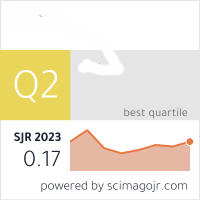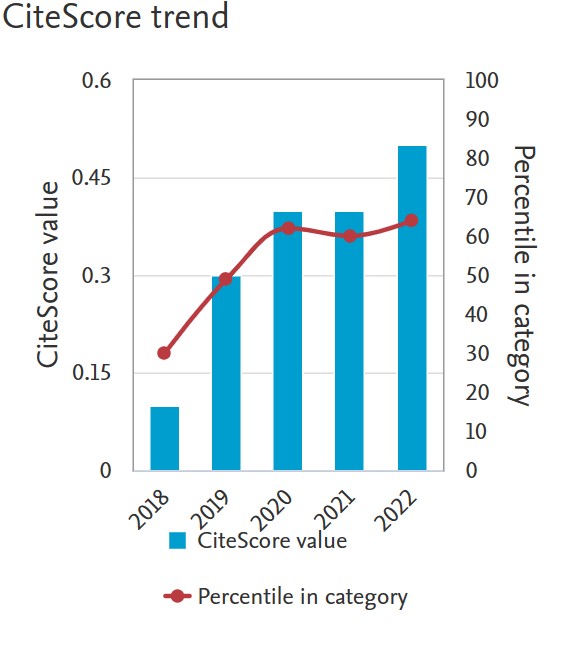Oligohydramnios as Prognostic Factor for Maternal Risk in Term Pregnancy and Fetal Outcome
Keywords:
Perinatal Morbidity and Mortality, Oligohydramnios, Neonates, Pregnant WomenAbstract
Objective: The objective of this study is to examine oligohydramnios as a predictor of maternal risk during term pregnancy and its impact on fetal outcomes. Study Design: cross-sectional study. Place and Duration: This study was conducted in Sandeman Provisional Hospital, Quetta from July 2022 to July 2023. Methodology All patients diagnosed with oligohydramnios were included through non-probability consecutive sampling technique. Informed consent was obtained from each participant after explaining the study's methodology. Demographic data, clinical characteristics, obstetrical complications, and delivery methods were documented. Maternal and newborn outcomes during inpatient care were observed and recorded. Results: The study sample's mean gestational age was 38.53 ± 2.13 weeks, and its mean age was 27.86 ± 4.42 years. The majority of women (82%) and patients (73%) both had normal weights and no concomitant conditions. Merely 9% reported having oligohydramnios during a prior pregnancy. The type of delivery used by 92% of the women in the research was caesarean section. In the Neonatal Intensive Care Unit (NICU), 15% of the newborns were admitted with a mean birth weight of 2.81 ± 0.52 kg. There was no statistically significant correlation (p-value > 0.05) between the mother's body mass index and the birth weight or the APGAR score at 1 and 5 minutes. Conclusions: Oligohydramnios, a common pregnancy complication, is associated with an increased risk of adverse postnatal outcomes, indicative of fetal compromise. Vigilant fetal surveillance, regular antenatal care, and appropriate interventions may contribute to reducing perinatal morbidity and mortality
Downloads
References
Chudal D, Bista KD, Pradhan N. Perinatal outcome associated with
oligohydramnios in term pregnancies. Nepal Medical Journal. 2018
Aug 21;l(01):25-30.
Bhuvaneswari S. Outcome in term Oligohydramnios: A Prospective study (Doctoral
dissertation, Coimbatore Medical College, Coimbatore).
Patil SV Shaikmohammed FZ. Study cf Oligohydramnios and its perinatal
outcome International Journal of Reproduction, Contraception,
Obstetrics and Gynecology 2019 Jul l;8(7):2705-9.
Hemalatha P. Obstetric Outcome in Cases of Oligohydramnios
Diagnosed After 34 Weeks of Gestation (Doctoral dissertation,
Rajiv Gandhi University of Health Sciences (India)).
Singh S, Gautam P. PERINATAL OUTCOME IN OLIGOHYDRAMNIOS
(AFI< 5) AT TERM. Int J Acad Med Pharm. 2023;5(3):1280-5.
Whittington JR, Ghahremani T, Friski A, Hamilton A, Magann EE Window to
the Womb: Amniotic Fluid and Postnatal Outcomes. International Journal
of Women's Health. 2023 Dec 31:117-24.
Kumari MS. A study on maternal and perinatal outcome in relation to
amniotic fluid volume in pregnant women at term with or without
risk factors. Parity.;35(40):9.
Sangeetha K. Pregnancy outcome in amniotic fluid index less than five in
term low risk pregnancy(Doctoral dissertation, Rajiv Gandhi
University of Health Sciences (India)).
ZosangpuiiWL. Prospective clinicalstudy of pregnancyoutcome in amniotic
fluid indexless than fivein termlow riskpregnancy, mortality 2019; 4:5.
Qazi M, Saqib N, Ahmed A, Wagay I. Therapeutic amnioinfusion in
oligohydramnios during pregnancy (excluding labor). International
Journal of Reproduction, Contraception, Obstetrics and
Gynecology. 2017 Oct l;6(10):4577-83.
Annie R. To study the maternal and perinatal outcome in term antenatal
mothers with borderline oligohydramnios who’s fetal
cerebroplacental ratio 1 (Doctoral dissertation, Madras Medical
College, Chennai).
Locatelli A, Vergani P, Toso L, Verderio M, Pezzullo JC, Ghidini A.
Perinatal outcome associated with oligohydramnios in
uncomplicated term pregnancies. Archives of gynecology and
obstetrics. 2004 Jan; 269: 130-3.
Gupta C. Prospective Study on Amniotic Fluid Index in Primigravidas at
-24 Weeks of Gestation and Maternal and Foetal
Outcome (Doctoral dissertation, Rajiv Gandhi University of Health
Sciences (India)).
Zakaria AE, Mohamed AH, Badr KA. The relationship between amniotic
fluid index (AFI) & single largest vertical pocket and perinatal
outcome in late severe preeclampsia. The Egyptian Journal of
Hospital Medicine. 2019 Apr l;75(4):2646-52.
Patel A, Patel HV. Role of amniotic fluid index in pregnancy outcome.
International Archives of Integrated Medicine. 2015 Aug 1;2(8).
Chitra N. Amniotic Fluid Index: Effect on labour and neonatal
outcome (Doctoral dissertation, Madras Medial College, Chennai).
Figueroa L, McClure EM, Swanson J, Nathan R, Garces AL, Moore JL,
Krebs NF, Hambidge KM, Bauserman M, Lokangaka A, Tshefu A.
Oligohydramnios: a prospective study of fetal, neonatal and
maternal outcomes in low-middle income countries. Reproductive
Health. 2020 Deql7(l):l-7.
Fracalozzi JD, Okido MM, Crott GC, Duarte G, Cavalli RD, Araujo Junior
E, Peixoto AB, Marcolin AC. Maternal, obstetric, and fetal Doppler
characteristics in a high-risk population: prediction of adverse
perinatal outcomes and of cesarean section due to intrapartum fetal
compromise. Radiologia Brasileira. 2023 Oct 9; 56: 179-86.
Downloads
Published
Issue
Section
License
You are free to:
- Share — copy and redistribute the material in any medium or format for any purpose, even commercially.
- Adapt — remix, transform, and build upon the material for any purpose, even commercially.
- The licensor cannot revoke these freedoms as long as you follow the license terms.
Under the following terms:
- Attribution — You must give appropriate credit , provide a link to the license, and indicate if changes were made . You may do so in any reasonable manner, but not in any way that suggests the licensor endorses you or your use.
- No additional restrictions — You may not apply legal terms or technological measures that legally restrict others from doing anything the license permits.
Notices:
You do not have to comply with the license for elements of the material in the public domain or where your use is permitted by an applicable exception or limitation .
No warranties are given. The license may not give you all of the permissions necessary for your intended use. For example, other rights such as publicity, privacy, or moral rights may limit how you use the material.











